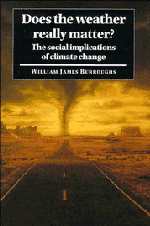7 - Consequences of forecasting
Published online by Cambridge University Press: 26 February 2010
Summary
‘When I use a word,’ Humpty Dumpty said in a rather scornful tone, ‘it means just what I choose it to mean – neither more nor less.’
Through The Looking-Glass, Chapter 6
Behind all the analysis of the economic impact of climatic change there lies the basic issue of whether forecasting is a good thing, or whether it does more harm than good. One thing is certain, forecasts are bound to be produced. So what matters is how much effort society devotes to this work and how its results are integrated into the most productive management of our affairs. So far we have taken the fatalistic view that there is no alternative to using forecasts as the option of disregarding them altogether is politically unacceptable. But we should be able to do better than this. It would be reassuring if, on balance, it could be shown that there are measurable benefits in forecasting. As forecasts are such an integral part of so much planning, it would be worrying if this was not the case, at least in the case of predictions which enable us to avoid short-term extremes and potential disaster.
In parallel with the simple question of whether forecasts are worth the effort, there is the question of the less quantifiable ways in which they infect all aspects of our lives. Although many people have a healthy scepticism about all forms of prediction we cannot get away from the profound influence they have in either making decisions, or, at least, justifying them. This means that, in the longer term, measuring the benefits may be less easy to determine.
- Type
- Chapter
- Information
- Does the Weather Really Matter?The Social Implications of Climate Change, pp. 174 - 193Publisher: Cambridge University PressPrint publication year: 1997



